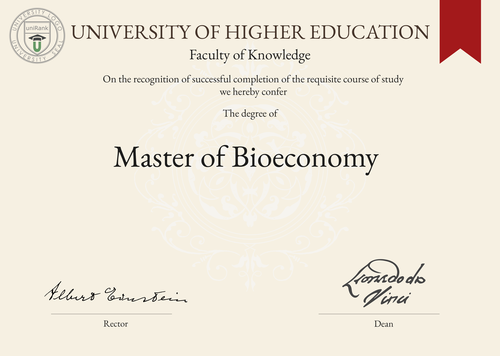
Master of Bioeconomy (M.Bioecon.)
Guide to Master of Bioeconomy Program/Course/Degree
Master of Bioeconomy (M.Bioecon.)

Program Name
Master of BioeconomyProgram or Degree abbreviation
M.Bioecon.Duration range
1-2 yearsTuition range
Varies by country and universityOverview
The Master of Bioeconomy program is designed to provide students with a comprehensive understanding of the principles and practices related to the sustainable use of biological resources. This interdisciplinary program combines elements of biology, economics and environmental science to equip graduates with the knowledge and skills necessary to address the challenges of managing and utilizing biological resources in a sustainable manner.Curriculum Overview by year
Year 1: - Introduction to Bioeconomy - Principles of Sustainable Resource Management - Economics of Bioeconomy - Biotechnology and Innovation - Environmental Policy and Governance Year 2: - Advanced Topics in Bioeconomy - Sustainable Agriculture and Food Systems - Renewable Energy and Biofuels - Business and Entrepreneurship in Bioeconomy - Research Project or InternshipKey Components
- Understanding the principles and practices of sustainable resource management - Analyzing the economic aspects of bioeconomy - Exploring the potential of biotechnology and innovation in bioeconomy - Examining environmental policies and governance related to bioeconomy - Developing skills in sustainable agriculture, renewable energy and business in bioeconomyCareer Prospects
Graduates of the Master of Bioeconomy program can pursue various career paths in both public and private sectors. They can work as bioeconomy consultants, sustainability analysts, environmental policy advisors, research scientists, project managers, or entrepreneurs in industries related to agriculture, biotechnology, renewable energy and environmental management.Salary Expectations
The salary expectations for graduates of the Master of Bioeconomy program can vary depending on factors such as the country, industry and level of experience. On average, professionals in this field can earn a competitive salary, with potential for growth as they gain more experience and expertise. For a more accurate understanding of salary expectations, you can utilize the Job Sites Search Engine, from our sister site jobRank, which searches over 4,600 job sites worldwide. Make sure to specify not only the job title but also the country you are interested in.Conclusions:
It is important to note that the duration, tuition fees, curriculum, key components, career prospects and salary expectations of the Master of Bioeconomy program can vary depending on the chosen country or location of study, as well as the specific university offering the program. Prospective students are encouraged to research and compare different programs to find the one that best aligns with their interests and goals. Visitors can use the uniRank World Universities Search Engine to explore where this specific degree, Master of Bioeconomy, is offered anywhere in the world.World Universities Search Engine
search for Master of Bioeconomy (M.Bioecon.) and add the Location (country, state etc.) or specific University you are interested in studying at.
Query examples:
- Master of Bioeconomy (M.Bioecon.) United States
- Master of Bioeconomy (M.Bioecon.) United Kingdom online
- Master of Bioeconomy (M.Bioecon.) Australia international students
- Master of Bioeconomy (M.Bioecon.) University of California
- Master of Bioeconomy (M.Bioecon.) University of London tuition fees
- Master of Bioeconomy (M.Bioecon.) University of Sydney scholarships
Share Program/Course
Interesting? Share this program/course/degree info with your friends now.